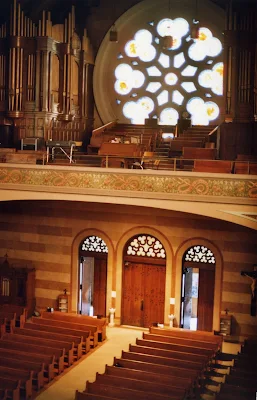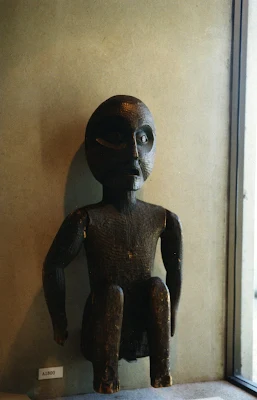
Sunday, February 22, 2009
Saturday, February 21, 2009
Friday, February 20, 2009
Where The Molsons Are Buried


 The doors to the Molson mausoleum, decorated with bare breasted angels, have now been removed as they had severely deteriorated over the years. These angels are, truly, an affirmation of life in the midst of death, even though someone doesn't know that angels are male and not female; anyhow, p,laying along with the eroticism these particular female angels are more abundantly endowed than one would expect. Perhaps there is an interesting story behind their creation.
The doors to the Molson mausoleum, decorated with bare breasted angels, have now been removed as they had severely deteriorated over the years. These angels are, truly, an affirmation of life in the midst of death, even though someone doesn't know that angels are male and not female; anyhow, p,laying along with the eroticism these particular female angels are more abundantly endowed than one would expect. Perhaps there is an interesting story behind their creation.
Wednesday, February 18, 2009
Tuesday, February 17, 2009
Monday, February 16, 2009
Sunday, February 15, 2009
Saturday, February 14, 2009
Artie Gold, two years later

Thursday, February 12, 2009
Tuesday, February 10, 2009
Monday, February 9, 2009
Notes on The Mystic Beast (1997)
 |
| The Mystic Beast, 1997 |
I first discovered the sculpture that I call “The Mystic Beast” (The Mystic Beast, Empyreal Press, Montreal 1997) around 1994 at Vancouver’s Museum of Anthropology, a museum that is largely dedicated to the art of First Nations people in British Columbia. He (the sculpture) was in a room just after the main hall as one enters the museum, placed off to one side near a window, so he is easily missed. In fact, the sculpture is a Northwest coast Nimpkish wood sculpture of a human figure, made around 1893. When I first saw him, I felt as though I had met my doppleganger; however, instead of a human double, it was an inanimate object.
I think CZ and I both immediately recognized the facial similarity that I shared with the Mystic Beast, but it was more than the expression on the face, it was also spiritual. I knew the meaning of his expression—so indicative of how I felt in life—for it showed my inner being: it was the face of an introvert trapped in a room full of extroverts; it was the face of one who is more at home being alone than with other people. It is a curious and rare experience to find a visual expression of one’s inner being, of one’s identity as a human being; he did not represent my persona, but the private face of the condition of my soul, he was the face of my Shadow.
The Mystic Beast
1. The Invention of the Mirror
How could this be me
what I see as myself,
meeting what is
not me
but someone else:
a doppleganger passing
in the street, a twin
I was separated from
at birth, a part
of me divided
and gone,
as though
I lost my shadow
and must stay indoors
to avoid the sun.
The mirrored image
of my right hand
as I raise it
seems to be
my right hand,
but in the mirror
if my right hand is holding a book
the words are reversed—
who we are,
we never see
what we’ve become—
unless a mirror
in which nothing
could be invented
is reversed, words
read as words,
then we could see
for the first time
in human history
our true selves;
meeting ourselves
as others see us
not reversed or backwards.
2. The Mystic Beast
Arriving on the west coast,
I find the perfect image
of myself, a wooden
statue staring
at nothingness
in a museum:
he is the mystic
beast—not reversed
in a mirror,
not divided by life—
but the single
essence of who
I am. This image
is not reversed
by fortune or glass,
silver or animation,
but the inner being
so long separated:
my own face
and body frozen
in time and regret.
It is the unreconstructed
self found at last,
like finding a cousin
or brother, the true
brother of light
and camaraderie
who holds
my arm and announces
the birth of poetry,
the beginning of light,
the conclusion of silence.
It is my self
I find, my lost twin,
the inner being
I was and am,
who escaped
long ago and
disappeared,
a face encountered
in a mirror without
distortion by depression
or a concave in which
I slip into silence;
not the face seen
reflected in store
windows, the one
caught in peripheral
vision looking afraid
and alone, but an image
of one born in Heaven,
who fell to earth
from the clouds
and landed among
strangers. I searched
almost half a century
until now
when I meet myself,
I finally step out
of the mirror
as out of my body
my skin like clothes,
my face a mask,
my shadow
disappearing in light,
my true self
before and after
my birth and death.
(Stephen Morrissey, The Mystic Beast, Empyreal Press, Montreal 1997;
ISBN 0-921852-16-9; The Shadow Trilogy, including The Compass (1993) and The Yoni Rocks (1995), was published by Empyreal Press in Montreal.)
Friday, February 6, 2009
Notes on The Yoni Rocks (1995)
Here is the title poem of The Yoni Rocks:
The Yoni Rocks
(Stephen Morrissey, The Yoni Rocks, Empyreal Press, Montreal 1995;
Monday, February 2, 2009
Notes on The Compass (1993)
The Compass (Empyreal Press, Montreal, 1993) is the first book of the Shadow Trilogy, books I wrote between 1989 and 1997. I had several titles before I decided on The Compass, which is also the title poem of the book. It is possible that I considered "The Home Front," because of the irony that it can refer to both a war between countries being fought on the home country’s border and to “home” with its suggestion of the promise of love, comfort, and happiness; I think, as well, of the title of the novel All Quiet on the Western Front, of World War One, and of the unhappily married caught in a War of the Roses scenario. However, now I wonder if this was one of my working titles, or was it for a book that was either never written or for a possible title for a previous book, Family Album? I don’t remember
Just today, I reread the poems in The Compass and the book is not quite as I remembered it. If anything, it is much more affirmative and positive than I had thought. It is divided into three sections: “The Whip,” “Hades,” and “The Compass.” “The Whip” is a continuation of Family Album (Caitlin Press, Vancouver, 1989), my book immediately preceding The Compass. The poems in “The Whip” are poems of family life, memory, observation; they are a continuation and development of the poems in Family Album. “Hades,” the second section, is made up of post-divorce poems, the outcome of the emotional and psychological experience of the divorce-- which was an emotional journey to Hades--and it is this section that is "confessional." The final section, “The Compass,” celebrates rebirth, sexuality, marriage, and romantic love.
I would like to explain the psychology that leads one to write three books on the human Shadow, the Jungian archetype encompassing the psychology of shame, projection, taboos, and self-loathing. I was always intrigued by Shadow content of consciousness; I always wrote with the intention of what C.G. Jung called individuation even before I had heard of Jung, that was always my concern in my writing, from when I began writing in 1965. I knew for many years that the way I was living was not right, but I was incapable of changing myself or the circumstances of my life. Fortunately, the soul will not allow stasis, we can not escape for long the demand of the soul for an authentic life. Thus it was, that after many years of avoiding life, events conspired to do for me what I could not do for myself, as will be explained below. I wrote about the avoidance of transformation in the following excerpt from a poem in The Mystic Beast (Empyreal Press, Montreal, 1997):
Lines From Magritte:
The Forbidden Universe (or Olympia)
A man refused
transformation—"not
yet" he argued "too busy
with family, job, mother,
no time"—always he held
back, remained in
a chrysalis state,
like putrefied matter, undigested
food, or a giant tumour
in his body
clogging all arteries
that lead cosmic
energy into the central
nervous system.
For forty years
a giant organic blockage
grew in the middle
of his body
until he bulged
at the waist;
it was a tumour
on his soul
or the soul
itself expanding
disproportionate
and constricted
by its cage of ribs
and internal organs.
He was sick
with undiagnosable
illnesses, his face anguished,
even walking across
a room became difficult.
In my experience big changes in the soul do not happen because of a series of insights and epiphanies; nor do they happen in a linear progression, or build to a final perfection. The soul does not care about time and space, or even about talking and discussing; change is not an evolution, not even a convoluted evolution, but something that happens to us, something that is beyond our conscious insistence, or desire, that we change into something that is unknown to us and of which we have no experience. I am not referring to the kind of insights we all have with some regularity, but to “the development of the soul,” to the kind of profound change that seems to seldom happen and can’t be made to happen.
The ways in which we attempt change are hit and miss: years of prayer result in nothing; years of meditating in a cave result in nothing; years of therapy result in nothing. These activities have a nobility to them, perhaps they lay a foundation for change, but there is no causal guarantee that they will result in the desired change. Indeed, I am not saying that these methods for changing the soul are without value or always fail to effect change, only that in my experience the kind of change that I am talking about comes, as it did for me, through what might be called “Divine intervention,” through fate or Providence, or something that comes to us without invitation and by its own volition.
Around 1986-1987, I was beginning a Pluto transit over my ascendant, which is when my marriage began to unravel and finally collapsed in the winter-spring of 1989. There were other terrible events around the same time, but they must wait for another discussion. A Pluto transit over the ascendant devastates and wipes out one’s life; this was my experience. It was a time when my old life was wiped away so that a new life could be created.
I, myself, soon came to affirm what had happened to me; I soon affirmed the annihilation of my old life as I knew it; it was the only way that I could embrace life and grow into the person I was meant to be. I felt that my old life was like a giant tumour growing in my body and I was unable to do anything about it, I was unable to cut it out myself, and it was not possible for someone else to remove it, it was the tumour of a psychological complex. I know what an unrealized life is like, I know what it is like when the compass that guides our life does not read accurately the direction in which we must make our journey if we are to find spiritual and psychological wholeness.
Change and transformation is also possible when we are loved by another, when the other focuses their love and attention on us and we reciprocate with love for the other. Love can move us closer to wholeness, change, and creativity. For many of us, what love means is to be animated, or brought to life, by another. This is a gift that must motivate us, who have been loved, to return to life the blessings of love that we have received.
Here’s the title poem from The Compass:
The Compass
On the four corners of the bed
the body becomes a compass
describing the direction
of desire and passion. Months of desire
arrive at this destination,
rocking on a single almost silent
wave we are sheltered
by darkness. The body
is a compass needle;
you turned me from east to west,
awoke a sleeping giant
that moves between your mouth and breasts and legs;
the room illuminated by static electricity
thrown off by our bodies.
How many decades did I sleep
waiting for only you;
I lust after you in all the directions of space.
Meeting at the airport
your foot touching my leg
beneath the restaurant table,
we secretly entered an empty banquet
hall where the caterers chattered and
poured drinks behind a wall partition
then quickly leaving
finding a deserted hallway of
open office doors
where we embraced.
All the others in my life
fell away, I was ready
to abandon my old life for you,
for the touch of your hand
and mouth, the apple red and delicious
cut in half that I eat.
Tied to the four corners of love
as to a bed which becomes a compass,
I find you on your stomach,
on your back, in the morning
lying pressed against me.
It is not possible to return
to sleep now, it is not possible
to forsake your touch and love,
black lace, fingers, wetness,
your mouth, words. The compass's
needle turns finding north switched
to east and west to south, night
becomes morning; nothing remains
as it was. You pointed my life
in a new direction, towards a corner
of the world only dreamt of before.
Outside the sun is red
descending behind a row of trees,
shadows fade into the other
unexplored regions of night.
(Stephen Morrissey, The Compass, Empyreal Press, Montreal 1993;












































